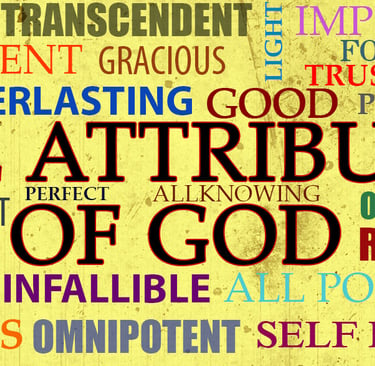Add your promotional text...
The Majesty and Mystery of God: Understanding His Nature and Eternal Plan
The Majesty and Mystery of God: Understanding His Nature and Eternal Plan
NITA ORSMONS
9/27/20244 min read


The Majesty and Mystery of God: Understanding His Nature and Eternal Plan
God, in Christian theology, is the supreme being, the creator of the universe, and the source of all life and existence. He is eternal, transcendent, omnipotent (all-powerful), omniscient (all-knowing), and omnipresent (present everywhere). God is both personal and relational, deeply involved in the lives of His creation, while remaining sovereign and above all.
1. The Nature of God
- Trinity: God is understood as a Trinity—Father, Son (Jesus Christ), and Holy Spirit—three distinct persons but one in essence. This concept is central to Christian belief and reflects the complexity of God’s nature.
- God the Father: The creator and sustainer of the universe, the Father is often seen as the source of all things, the one who commands and directs.
- God the Son: Jesus Christ, the incarnate Word of God, is the savior who lived on earth, died for humanity's sins, and rose again, offering salvation and eternal life.
- God the Holy Spirit: The Spirit of God dwells within believers, guiding, comforting, and empowering them to live godly lives.
- Omnipotence: God’s power has no limits. He created the heavens and the earth out of nothing (Genesis 1:1) and sustains all things by His will. Nothing is impossible for Him (Luke 1:37).
- Omniscience: God knows all things—past, present, and future. His understanding is infinite (Psalm 147:5), and nothing is hidden from Him. He knows the thoughts and hearts of all people (Psalm 139:1-4).
- Omnipresence: God is present everywhere at all times. He is not bound by space or time, and there is no place where His presence cannot be found (Jeremiah 23:23-24; Psalm 139:7-12).
2. Attributes of God
- Holiness: God is absolutely holy, without sin or moral imperfection. His holiness separates Him from all evil, and He calls His people to be holy as well (Leviticus 19:2). Holiness is a defining characteristic of God’s nature, and it reflects His moral purity and righteousness.
- Love: God's love is central to His character. The Bible declares that "God is love" (1 John 4:8). His love is unconditional (agape love), sacrificial, and steadfast, most clearly demonstrated through the sacrifice of Jesus on the cross (John 3:16). God’s love seeks the good of His creation, and His mercy and compassion are extended to all who turn to Him.
- Justice: God is just and fair in all His ways. He upholds righteousness and is the ultimate judge who will hold everyone accountable for their actions (Psalm 89:14). His justice ensures that sin is punished, but He is also merciful, offering forgiveness through repentance and faith in Christ.
- Mercy: God's mercy flows from His love and patience. He shows compassion and withholds deserved punishment, offering forgiveness and grace instead (Ephesians 2:4-5). His mercy is a source of hope for humanity, providing the opportunity for redemption.
- Sovereignty: God’s will and purpose are supreme over all creation. He governs the world and history according to His divine plan. Though He allows free will, His ultimate purpose will always prevail (Isaiah 46:10).
3. God as Creator
God is the creator of all things. The Bible begins with the declaration, “In the beginning, God created the heavens and the earth” (Genesis 1:1). Everything in the universe, from the vast galaxies to the smallest atom, is the work of His hands. He created humanity in His own image (Genesis 1:27), giving people a special place in creation with the ability to think, feel, and relate to Him.
4. God as Sustainer
Not only did God create the universe, but He also sustains it by His power. Colossians 1:17 says, “He is before all things, and in Him all things hold together.” God continually upholds the natural world, maintaining order and life. He provides for all creation, ensuring that everything functions according to His will.
5. God’s Relationship with Humanity
- Covenant Relationship: Throughout the Bible, God forms covenants (binding agreements) with humanity, reflecting His desire for a relationship with His creation. The most notable covenants include those with Noah (Genesis 9), Abraham (Genesis 12), and the people of Israel (Exodus 19-24). These covenants often involve promises from God and the expectation of obedience from people.
- Revelation of God: God reveals Himself to humanity through His creation (Psalm 19:1-2), through His Word (the Bible), and most fully through Jesus Christ (Hebrews 1:1-3). He desires to be known and has made Himself accessible to all who seek Him.
6. God’s Plan of Salvation
The most profound aspect of God’s interaction with humanity is His plan of salvation. Humanity, having fallen into sin through Adam and Eve, is in need of redemption. God’s response to sin is both just and loving. His justice requires the punishment of sin, but His love provides a way for humanity to be saved from sin’s consequences.
- Jesus Christ: The central figure of God’s redemptive plan is Jesus Christ, the Son of God. Through His death on the cross, Jesus paid the penalty for sin, and through His resurrection, He defeated death, offering eternal life to all who believe in Him (John 3:16). God’s grace and mercy are fully revealed in this act of selfless love.
- The Holy Spirit: After Jesus’ ascension, God sent the Holy Spirit to dwell within believers, guiding them into all truth, comforting them, and empowering them to live in obedience to God’s commands. The Holy Spirit is the active presence of God in the world today.
7. God’s Kingdom
God is also portrayed as a king, ruling over a kingdom that is both present and yet to come. Jesus proclaimed the coming of the Kingdom of God during His earthly ministry, and this kingdom is where God’s will is done perfectly. While the kingdom is already at work in the hearts of believers, its full manifestation will come at the end of the age when Christ returns to establish a new heaven and earth (Revelation 21:1-5).
8. God’s Eternal Plan
- Second Coming: Christian eschatology (study of the end times) teaches that God will bring history to its ultimate conclusion with the return of Christ. This is when all things will be made new, and God will establish His eternal kingdom, where there will be no more sin, suffering, or death (Revelation 22:3-5).
- Eternal Fellowship: In eternity, God’s people will dwell with Him in perfect fellowship. The Bible describes this as a place where God will wipe away every tear, and there will be no more mourning or pain (Revelation 21:4).
